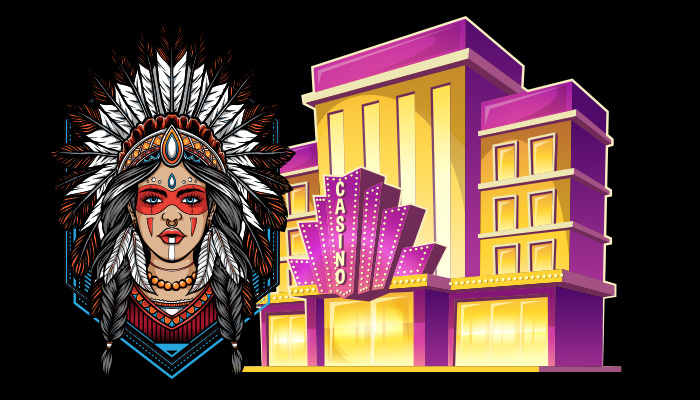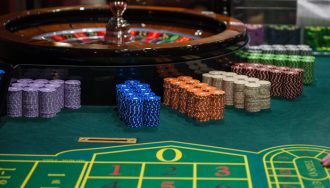What Are Indian Casinos?
 Indian Casinos
Indian Casinos
- The Best Native American Casinos
- What Are Native American Casinos?
- Rules and Regulations
- The Best Native American Casino
- What Makes Indian Casinos Unique?
- Why Aren’t There More Casinos?
The United States is home to many Native American casinos. But what are Indian casinos? And what is tribal gaming? On this page, we’ll be looking at what Native Indian casinos are, why they’re so common in the US – and what you need to know before heading to one for yourself.
What Are Indian Casinos? An Introduction
Native American casinos are housed on reservations that have, many times, been owned by tribes for multiple generations. The legal framework behind Native American casinos can often be complex – but the casinos are often great places to gamble.
Today, we’ll be showing you the top Indian casinos in the United States – and we’ll show you some of the important distinctions between tribal and commercial casinos.
What Are Indian Casinos and What is Tribal Gaming?
What are tribal casinos? Native American casinos are casinos that are owned and operated by Native American tribes. These casinos are located on tribal land, and are authorized by the Indian Gaming Regulatory Act, a federal law that was passed in 1988.
But what is tribal gaming? Well, Native American-owned casinos are allowed to offer players a vast selection of casino games. These include video slots, casino table games, and bingo. All the revenue these games bring in is used to support tribal governments and programs. It’s also used to help fund education, infrastructure, and even healthcare in the local community.
At the time of writing, there are 524 tribal casinos operating in the USA – and these land-based casinos are owned and operated by 254 different tribes. They operate in 29 of the US’ 50 states, and, according to recent research, the annual revenue from all casinos combined tops $32 billion. This represents some 43% of all gaming revenue in the USA.
If you’re looking for the top Native American casinos, make sure to keep reading. Later on this page, we’re going to show you some of the main establishments, and look at why they’re so popular with gamblers.
What Is The Indian Regulatory Act?
When looking to find the answer to “What are tribal casinos” it’s important to understand the Indian Gaming Regulatory Act (IGRA) – a federal law that was passed in 1988. The idea behind enacting this law was to create a solid framework to use when regulating tribal-owned casinos. According to the rules created by the IGRA, all forms of land-based gambling on tribal land falls into one of three different categories.
Class I gaming includes traditional Indian games and social gaming for “small” prizes. This type of gaming is usually left unregulated; this means that it’s up to the tribes to self-regulate, something some politicians have voiced concerns over.
Class II gaming includes bingo, pull-tabs, punch boards, and other games similar to bingo. This type of gaming is regulated by the National Indian Gaming Commission (NIGC), which is an independent federal agency. The NIGC sets standards for Class II gaming and has the legal power to approve or reject applications from tribal groups, whether that pertains to new games, or new establishments.
Class III gaming includes all forms of gaming that are not already covered in Class I or Class II, like video slots, casino table games, and poker. These types of casino games are, in addition, regulated by the NIGC. However, alongside the NIGC’s standards, these games must also be conducted in accordance with a tribal-state compact.
A tribal-state compact is an agreement between a tribe and a state. Within the compact, the two parties agree upon rules for Class III gaming – but only when it takes place on tribal lands. The compact must be approved by the Department of the Interior and the state governor; without this approval it’s meaningless.
The IGRA also created the National Indian Gaming Commission (NIGC). The NIGC is an independent federal agency which is responsible for regulating Class II and III licenses. Interestingly, the NIGC is only made up of three workers – and these workers are directly appointed by the President and approved by the Senate.
The NIGC has the legal power to approve or reject tribal gaming applications and they also have notable power to conduct audits – sometimes, without any prior notice. They are also able to carry out investigations of Indian gaming operations; this includes taking enforcement action against tribes or individuals who violate the IGRA or other federal laws.
What Are Tribal Casinos You Should Visit?
The “best” Indian casino is subjective; what you might like may not appeal to other players. However, if you’re looking to enjoy the thrills of gambling – but want to avoid the tourist-y hotspots like Vegas – they can be an excellent alternative.
As an added benefit, there are Native American casinos located all around the USA. You’ll find them in some 29 states, and this means you rarely have to travel far to be able to find one.
Please note that laws can differ a lot from state-to-state. For example, in some states the minimum age to gamble is 21, whereas in others, it’s just 18. As a result, some native-owned casinos also have their own rules and regulations. Below, we look at some of the best Indian casinos.
| Casino Name | Location |
|---|---|
| San Manuel Indian Bingo and Casino | Highland, California |
| Mystic Lake Casino Hotel | Prior Lake, Minnesota |
| Choctaw Casino Resort | Durant, Oklahoma |
| Seminole Casino Coconut Creek | Coconut Creek, Florida |
| Agua Caliente Casino Resort Spa | Rancho Mirage, California |
| Pechanga Resort and Casino | Temecula, California |
The Differences Between Indian Casinos and Commercial Casinos
Native American casinos can provide a number of benefits to tribes and their communities. Some of the potential benefits of these casinos include:
Economic development: Native American casinos can decrease local unemployment rates while simultaneously stimulating economic activity in tribal communities. This increase in jobs can reduce poverty and can provide a source of revenue for tribal governments.
Cultural preservation: Native American casinos can provide tribes with a source of revenue that can be used to fund programs and initiatives that promote their culture and traditions. This can help to ensure that Native American don’t die out; something critics have been worried about for several years.
Community development: Native American casinos often use their funds to give tribes money to put into programs and initiatives that benefit the community. Each tribe has their own initiatives, but these benefits are usually centered around healthcare, education, or infrastructure.
Self-sufficiency: Native American casinos also allow tribes to be self-sufficient; it’s money that’s independent of federal taxes. This helps tribes to become more self-sufficient.
However, there are also several differences between the best Indian casinos and commercial casinos. We will look at some of the core differences, below.
State Legislation
There are several differences between Native American casinos and commercial operations when it comes to the law – and the exact legal terms used, depend entirely on the state. In general, if a state allows commercial land-based casinos to operate, tribal casinos are usually able to offer the same games – although this isn’t always the case.
For example, there are cases where tribal casinos have only been able to offer a smaller range of games than commercial casinos. Minnesota, North Dakota, Washington and California are four good examples – and this is because card games are legal outside of the reservations, but illegal within them. To combat this, some tribes created compacts to get around the rules.
Game Variety
As a general rule of thumb, Indian casinos offer slot machines and video poker; historically, they haven’t been major hotspots for casino table games, although this has started to change in recent years.
There are also circumstances where tribal casinos have been limited to offering bingo, horse racing, and raffles. There are ongoing legal disputes between some tribes and state governments, in an attempt to ensure they’re able to compete with commercial operations.
Video Poker Legislation
Video poker players will often notice differences between the video poker machines available at tribal casinos versus commercial outlets. For example, if you head to a land-based casino in Vegas, you’ll generally find Class II machines in use. Tribal casinos, however, generally don’t offer Class II machines – opting to use Class III poker, instead – and this means that the virtual decks in place aren’t necessarily random.
Payout Percentages
Even if a tribal casino offers the same games as a commercial casino, the payout percentages of the games aren’t always the same. For example, some reservation casinos have been accused of offering far lower payout percentages when compared against their commercial counterparts – and this is one of the downsides of playing at a commercial casino.
The game rules can also differ; for example, some tribal casino Blackjack plays differently to commercial casino Blackjack. Some Blackjack games, for example, may require the dealer to hit on a soft 17 – which isn’t always the case at commercial operations.
Can All Native American Tribes Have Casinos?
As mentioned earlier, the Indian Gaming Regulatory Act is responsible for regulating all tribal casinos in the USA. However, tribes need to meet one of two different situations before they’re able to begin offering legal betting on their premises.
In the first scenario, the type of gambling the tribe wants to begin offering must already be legal in the state. If this is the case, then the tribe’s gambling operations will not be subject to any taxations or limits.
The second scenario where a tribal casino can open its doors is when they work directly with the state’s governor. If no commercial casinos are operational in the state, the tribes can approach the governor and make a proposition; they state the casino games they want to offer and propose a tax rate. It’s then down to the governor to decide whether or not to approve the license.
This means that there are some cases where tribal casinos aren’t allowed to open; however, there are more tribal casinos than ever before, and states usually take quite a favorable view when it comes to awarding them licenses.




